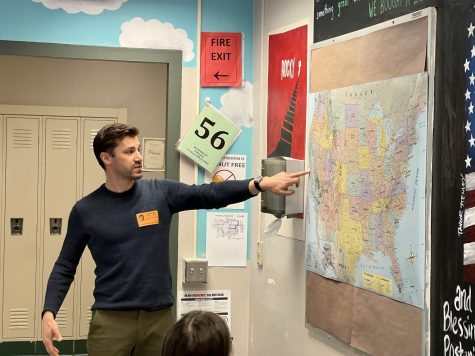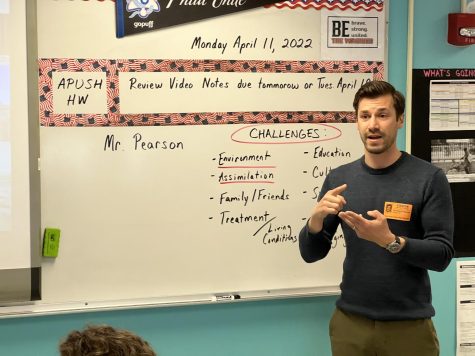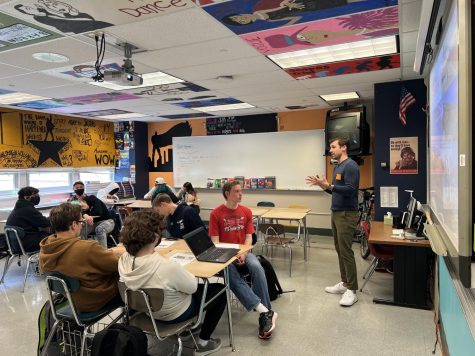Pearson Imparts Wisdom about Japanese American Incarceration
April 29, 2022

Author Bradford Pearson visited the high school’s AP United States History classes to discuss Japanese American incarceration in his first book, “The Eagles of Heart Mountain” on Tuesday, April 12.
As a former writer for the New York Times and editor of various publications, Pearson’s debut as an author with historical nonfiction has touched the hearts of many.
The story encompasses a winding tale of “football, incarceration and resistance” in the United States during the World War II time period.
When asked for his inspiration in writing the piece, Pearson admits his passion for the story.
“I got this idea for the book back in 2016,” Pearson said. “I felt that 2016 was a very divisive year in U.S. politics and life in the U.S. I started working on it, and I was looking for a project to work on that spoke to some of that divisiveness from a historical perspective. This book lined up a lot with certainly my beliefs and what I wanted to do with my career at that point.”
When he began to write the book, Pearson felt that the story needed a spotlight to be able to communicate its strong ties to racial and political injustices as well as discrimination within the time period.
“The topic of Japanese American incarceration… Everybody looks through this lens of just that, Japanese American history and the imprisonment of it,” Pearson said. “It does get out a lot of different topics that are important to mid-century America; such as racism, housing, civil rights, especially. A lot of the things that Japanese Americans went through [in] the 40’s African Americans have been dealing with for a really long time in the U.S.”

Not only are the issues of the World War II time period evident in “The Eagles of Heart Mountain,” but readers also experience the strength and resilience of the Japanese Americans who the book places its focus on.
¨When [you are] looking through a lot of history you have to find characters that can tell a broader story,” Pearson said. “Two of my main characters were young men named George Yoshinaga and Babe Nomura, came from very different backgrounds. They are both Japanese Americans during World War II. One of them group up in Hollywood, and another one grew up as a strawberry farmer. They had two very different backgrounds to how they ended up in these camps. They came together and became best friends through sports and through football.
AP U.S. History teacher Andrew Warren realized that there were various connections between George Yoshinaga and Babe Nomura’s story and the curriculum.
Warren hopes that through the ideals and lessons reflected in Pearson’s work and his discussion with the class, students will be able to enrich their awareness of Japanese Americans and their culture.
“Mr. Pearson’s visit provided students with the opportunity to enrich their understanding of Japanese American incarceration,” Warren said. ¨While history textbooks often focus on related historical topics such as the attack on Pearl Harbor and Executive Order 9066, his discussion of The Eagles of Heart Mountain gave students a window into the Japanese American experience during World War II. The story of the Heart Mountain Eagles also helped to deepen student awareness of how Japanese Americans developed resilience and engaged in acts of resistance.”
As a teacher, Warren found that Pearson conveyed his passion for his book in such a way that spoke to his students.
“One of the most surprising aspects of Mr. Pearson’s visit was his natural ability to engage with high school students,” Warren said. ¨He spoke about the creative choice to write his book from the perspective of Japanese American high schoolers since being a teenager is a universal experience for readers. While Mr. Pearson is a journalist and author, he briefly worked as a substitute teacher and his experience showed in his ability to capture the attention of my classes during his visit.¨
Sophomore AP U.S. history student Tyler Burgess attended one of the class periods where he had the opportunity to listen to Pearson speak on his book.

“I believe Mr. Pearson should visit the APUSH students again because he gave us a greater insight into what it was like living in the Japanese Internment Camps during WWII,¨ Burgess said.“His book, ´The Eagles of Heart Mountain´ is a must read because it combines both aspects from football and history to make it reach larger demographics. It also helps that it was written from a teenager’a perspective, which makes teenagers want to read it more so than if it were written from a different perspective.”
Pearson leaves all SHS students with a final thought that he hopes they will carry with them after teaching about “The Eagles of Heart Mountain.”
¨Every person has the ability to be a writer,” Pearson said. ¨The big thing that you need to have that career is to just be curious. Be curious about your life, and be curious about your community and the world around you. If you are curious, your curiosity will bring you very far in life no matter your profession.¨